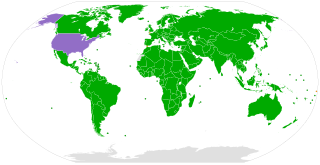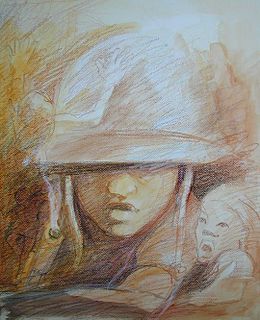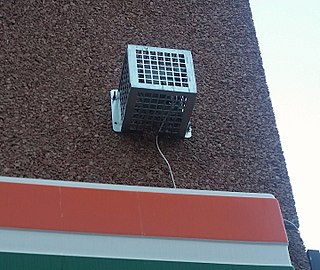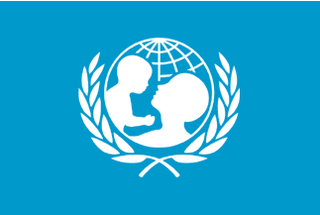Related Research Articles

The United Nations Convention on the Rights of the Child is an international human rights treaty which sets out the civil, political, economic, social, health and cultural rights of children. The Convention defines a child as any human being under the age of eighteen, unless the age of majority is attained earlier under national legislation.
Child Soldiers International, formerly the Coalition to Stop the Use of Child Soldiers, was a UK-based non-governmental organization that worked to prevent the recruitment, use and exploitation of children by armed forces and groups. As of 7 June 2019, it is no longer operational.

Children have been recruited for participation in military operations and campaigns throughout history and in many cultures.
The Save the Children Fund, commonly known as Save the Children, is an international non-governmental organization established in the United Kingdom in 1919 to improve the lives of children through better education, health care, and economic opportunities, as well as providing emergency aid in natural disasters, war, and other conflicts. After passing a century, which it celebrated in 2019, it is now a global movement made up of 30 national member organizations that work in 120 countries.

Anti-Slavery International, founded as the British and Foreign Anti-Slavery Society in 1839, is an international non-governmental organisation, registered charity and advocacy group, based in the United Kingdom. It is the world's oldest international human rights organisation, and works exclusively against slavery and related abuses.
Children's rights are a subset of human rights with particular attention to the rights of special protection and care afforded to minors.. The 1989 Convention on the Rights of the Child (CRC) defines a child as "any human being below the age of eighteen years, unless under the law applicable to the child, majority is attained earlier." Children's rights includes their right to association with both parents, human identity as well as the basic needs for physical protection, food, universal state-paid education, health care, and criminal laws appropriate for the age and development of the child, equal protection of the child's civil rights, and freedom from discrimination on the basis of the child's race, gender, sexual orientation, gender identity, national origin, religion, disability, color, ethnicity, or other characteristics. Interpretations of children's rights range from allowing children the capacity for autonomous action to the enforcement of children being physically, mentally and emotionally free from abuse, though what constitutes "abuse" is a matter of debate. Other definitions include the rights to care and nurturing. There are no definitions of other terms used to describe young people such as "adolescents", "teenagers", or "youth" in international law, but the children's rights movement is considered distinct from the youth rights movement. The field of children's rights spans the fields of law, politics, religion, and morality.

The Optional Protocol to the Convention on the Rights of the Child on the Involvement of Children in Armed Conflict (OPAC), also known as the child soldier treaty, is a multilateral treaty whereby states agree to: 1) prohibit the conscription into the military of children under the age of 18; 2) ensure that military recruits are no younger than 16; and 3) prevent recruits aged 16 or 17 from taking a direct part in hostilities. The treaty also forbids non-state armed groups from recruiting anyone under the age of 18 for any purpose.
Action on Smoking and Health (ASH) is the name of a number of autonomous pressure groups (charities) in the anglosphere that seek to publicize the risks associated with tobacco smoking and campaign for greater restrictions on use and on cigarette and tobacco sales.

The Mosquito or Mosquito alarm is a machine used to deter loitering by emitting sound at high frequency. In some versions, it is intentionally tuned to be heard primarily by younger people. The devices have attracted controversy on the basis of human rights and discrimination concerns.
Article 12 was a youth-led children's rights organisation based in England. Its main aim was to ensure the implementation of the United Nations Convention on the Rights of the Child (UNCRC), specifically Article 12. The group, run by a steering committee, worked to ensure the rights of young people were heard by decision makers. It was founded after a young people's rights conference in Greenwich, London, and was run by and for young people aged 18 and under. The administrative duties of Article 12 were run by Children's Rights Alliance for England (CRAE).

The British Youth Council, known informally as BYC, is a UK charity that works to empower young people and promote their interests. The national charity, run by young people, exists to represent the views of young people to government and decision-makers at a local, national, European and international level; and to promote the increased participation of young people in society and public life. It is partly funded by the Department for Digital, Culture, Media and Sport and UK Parliament.

Prince Zeid bin Ra'ad bin Zeid al-Hussein is a Jordanian former diplomat who is the Perry World House Professor of the Practice of Law and Human Rights at the University of Pennsylvania. He is also the president and CEO of the International Peace Institute. He also served as United Nations High Commissioner for Human Rights from 2014 to 2018. He played a central role in the establishment of the International Criminal Court, and was elected the first president of the Assembly of State Parties of the International Criminal Court in September 2002. He also served as a political affairs officer in UNPROFOR in the former Yugoslavia from 1994 to 1996.

UN Watch is a Geneva-based non-governmental organization whose stated mission is "to monitor the performance of the United Nations by the yardstick of its own Charter". It is an accredited NGO in Special Consultative Status to the UN Economic and Social Council and an Associate NGO to the UN Department of Public Information.
Stop Child Executions was a non-profit organization co-founded by Nazanin Afshin-Jam that aims to put an end to executions of minors in Iran. The organization campaigned to raise awareness about the issue and to put pressure on the government of the Islamic Republic of Iran, both in Iran and internationally. SCE was a follow-up effort to the successful campaign and petition that helped save the life of Nazanin Fatehi, an Iranian teenager sentenced to death for killing her attempted rapist. The "Save Nazanin" petition garnered more than 350,000 signatures worldwide. Fatehi was released from prison in 2007.
The Office of theChildren's Commissioner for England is a non-departmental public body in England responsible for promoting and protecting the rights of children as set out in the United Nations Convention on the Rights of the Child, as well as other human rights legislation, such as the Human Rights Act 1998. The Children's Commissioner was established under the Children Act 2004 to "represent the views and interests of children", and the office was further strengthened by the Children and Families Act 2014 providing a legal mandate to promote and protect the rights of children. According to the Commissioner's website, the role's purpose is to facilitate long-term improvements for all children, and in particular for the most vulnerable, and involves “being the eyes and ears of children within the system and the country as a whole", as well as acting with political independence from government, children's agencies and the voluntary and private sectors. The Children's Commissioner also has a duty to speak on behalf of all children in the United Kingdom on non-devolved issues, which include immigration, and youth justice in Wales.

UNICEF, originally called the United Nations International Children's Emergency Fund in full, now officially United Nations Children's Fund, is an agency of the United Nations responsible for providing humanitarian and developmental aid to children worldwide. The agency is among the most widespread and recognizable social welfare organizations in the world, with a presence in 192 countries and territories. UNICEF's activities include providing immunizations and disease prevention, administering treatment for children and mothers with HIV, enhancing childhood and maternal nutrition, improving sanitation, promoting education, and providing emergency relief in response to disasters.

Intersex people in the United Kingdom face significant gaps in legal protections, particularly in protection from non-consensual medical interventions, and protection from discrimination. Actions by intersex civil society organisations aim to eliminate unnecessary medical interventions and harmful practices, promote social acceptance, and equality in line with Council of Europe and United Nations demands. Intersex civil society organisations campaign for greater social acceptance, understanding of issues of bodily autonomy, and recognition of the human rights of intersex people.

Intersex rights in China including the People's Republic of China, the Hong Kong Special Administrative Region, etc., are protections and rights afforded to intersex people through legislation and regulation. Obligations also arise in United Nations member states that sign international human rights treaties, such as the People's Republic of China. Intersex people in China suffer discrimination. Issues include both lack of access to health care and coercive genital surgeries.

Intersex people in Switzerland have no recognition of rights to physical integrity and bodily autonomy, and no specific protections from discrimination on the basis of sex characteristics. In 2012, the Swiss National Advisory Commission on Biomedical Ethics published a report on the medical management of differences of sex development or intersex variations.
References
- ↑ "The Children's Rights Alliance for England merges into Just for Kids Law - CRAE". Children's Rights Alliance for England. Retrieved 28 February 2019.
- ↑ "Children's Human Rights". Directgov. Archived from the original on 23 October 2008. Retrieved 23 October 2008.
- ↑ Full list of NCVYS members Archived May 12, 2013, at the Wayback Machine
- ↑ "Checking Children's Rights". Children's Rights Alliance for England. Archived from the original on 6 October 2008. Retrieved 23 October 2008.
- ↑ "CRC/C/GBR/CO/4" (PDF). United Nations Committee on the Rights of the Child. Retrieved 10 May 2009.
- ↑ "See it, say it, change it" (PDF). Archived (PDF) from the original on 8 May 2018. Retrieved 10 January 2020.